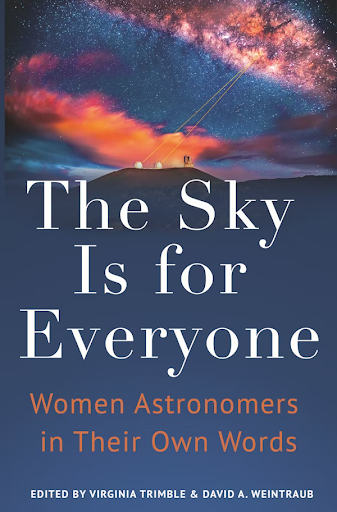The Sky is for Everyone – A Virtual Discussion with Virginia Trimble and David Weintraub

Women scientists were once an extreme rarity and still make up considerably less than half of the practicing scientists around the world, especially in subjects like physics and astronomy. But things are changing! The Sky is for Everyone: Women Astronomers in Their Own Words (Princeton University Press, 2022) reveals some of those changes. It consists of 37 autobiographical chapters by women astronomers whose PhDs range from 1963 to 2010. They come from many different institutions, countries, and cultures, and each story is different. Since these are women who succeeded in earning PhDs and have stayed in science, every story has a happy ending, though sometimes after considerable trials and tribulations.
Join us for a virtual discussion with editors Virginia Trimble and David Weintraub, who will discuss the thought and work that went into the creation of this volume, the stories they hoped to highlight, and their desire to someday provide a second volume, with greater diversity in the characteristics of the authors.
The event will take place on Thursday, April 6 at 1:00 p.m. ET via Zoom Webinar. The event is free to attend but registration is required. Register here to attend.
Virginia Trimble is a native Californian and graduate of Hollywood High School, UCLA (BA physics & astronomy, 1964) and the California Institute of Technology (PhD Astronomy, 1968), with honorary degrees from the University of Cambridge in England (MA 1969) and the University of Valencia (dott. h.c. 2010). She is currently Prof. of Physics and Astronomy at the University of California Irvine, where she is the oldest member of the faculty still on full active duty. For 28 years, she and her late husband, Joseph Weber, shared appointments at UCI and the University of Maryland (where he developed the first detectors for gravitational radiation). Trimble's early astronomical research included measuring gravitational redshift in the spectra of white dwarf stars, tracing out motions and energetics in the Crab Nebula (remnant of a supernova seen from earth in 1054), and chasing down the distribution of mass ratios in various kinds of binary stars as a handle on how they might have formed. More recently, she has focused on history of astronomy and physics (for instance a recent article on J. Robert Oppenheimer's forays into astrophysics before and after World War II) and scientometrics (for instance statistics on what it takes to get your papers accepted quickly and have them highly cited - yes, it still pays to be male, though not as much as it used to). She has held offices and committee responsibilities in six or eight professional societies (currently the Working Group on Preservation of Astronomical History of the American Astronomical Society, the Fellowship Committee of Sigma Xi, the Committee on International Freedom of Scientists of the American Physical Society, and the Organizing Committee of the Commission on History and Philosophy of Astronomy of the International Astronomical Union). Prof. Trimble is teaching Physics of Music this quarter at UCI and will venture into The Impact of World War II on the Sciences in spring quarter.
David A. Weintraub is Professor of Astronomy at Vanderbilt University where he founded and directs the Communication of Science and Technology program and does research on the formation of stars and planets. He is the 2015 winner of the Klopsteg Award from the American Association of Physics Teachers, which recognizes the outstanding communication of the excitement of contemporary physics to the general public. His previous books include Life on Mars: What to Know Before We Go (2018, PUP), Religions and Extraterrestrial Life: How Will We Deal With It? (2014, Springer), How Old is the Universe? (2010, PUP), and Is Pluto a Planet? (2006, PUP). He also created and edits the Who Me? series of scientific biographies for fifth-grade level readers.
